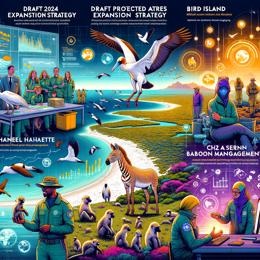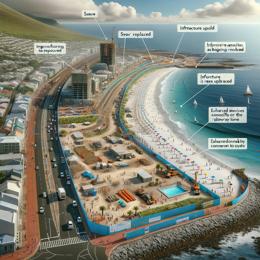Image created by AI
Balancing Biodiversity and Livelihoods: The Clash Over Penguin Protection and Fishing in South Africa
In a clash that epitomizes the ongoing struggle between environmental conservation and economic activity, South Africa faces a critical decision: safeguarding the rapidly declining African penguin populations versus sustaining a lucrative pelagic fishing industry. The proposed introduction of "no-take" zones, areas off-limits to fishing near six penguin breeding islands, has drawn the battle lines, pitting conservationists against fishermen in a legal and ecological standoff.
The heart of the conflict lies in the soaring potential cost to the fishing industry, with estimates suggesting an annual loss of R190-million and the potential elimination of 794 jobs if the increased no-take zones are implemented. This dwarfs the current concessions, which have already seen the industry forgo R90-million a year and have resulted in 371 job cuts. For Mike Copeland, chairperson of the South African Pelagic Fishing Industry Association, the proposed lockdown on fishing areas is economically unbearable—a move that could debilitate an industry that is a vital source of employment for thousands, currently boasting a revenue of approximately R5.5-billion.
Despite economic concerns, conservationists rally around the distressing projection that at the current rate of decline, African penguins could face extinction by 2035. Temporary closures were established around breeding sites to ease penguin populations' plunge and were validated by former environment minister Barbara Creecy, aiming to provide a stopgap while the fishing industry and conservationists sought a longer-term agreement.
Seeking to further bolster penguin conservation, BirdLife South Africa and the Southern African Foundation for the Conservation of Coastal Birds have pushed for new no-take zones, arguing in court for immediate action. Additionally, an international expert panel suggested a compromise by proposing a trade-off mechanism to benefit both conservation efforts and the fishing industry. The conservation bodies have embraced this, though industry representatives challenge the scientific underpinnings of these proposed zones.
Amid these conflicting perspectives and the absence of common ground, the court case has become even more unsettled with a new environment minister, Dr. Dion George, proposing an out-of-court settlement. Dr. George's decision to negotiate has not come without controversy, as affected parties were not consulted, setting a scene of uncertainty and tension on the shores of South Africa's economic and ecological future.
As the case heads to the Pretoria Division of the Gauteng High Court scheduled for late October, the nation awaits a resolution that delicately balances two vital interests: the protection of an endangered species and the survival of a key economic sector. South Africa must navigate these tumultuous waters with care, as the world watches a common dilemma unfold—how to achieve conservation goals without capsizing the boat of commerce upon which many livelihoods depend.










